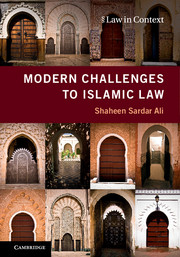Book contents
- Frontmatter
- Dedication
- Contents
- Acknowledgements
- Glossary
- Table of Cases
- Table of Legislation
- Introduction
- 1 Sharia: The Flowing Stream
- 2 An Elephant in the Room or a Needle in a Haystack? Searching for ‘Islamic’ Constitutionalism(s)
- 3 Contextualizing Family Law Reform and Plural Legalities in Post-colonial Pakistan
- 4 In Search of Legitimacy: The Dilemma of Islamic Finance
- 5 Muslim Women's Contributions to Drafting CEDAW: An Untold Narrative
- 6 CEDAW? What's That? ‘Domesticating’ ‘International’ Women's Human Rights in Muslim Jurisdictions: Reflections on Pakistan's Engagement with CEDAW
- 7 ‘Between the Devil and the Deep Blue Sea’: Sharia Councils and Muslim Women's Rights in the British Muslim Diaspora
- 8 Internet Fatawa: Challenging Tradition and Modernity in Women and Gender Issues
- Conclusion
- Bibliography
- Index
5 - Muslim Women's Contributions to Drafting CEDAW: An Untold Narrative
Published online by Cambridge University Press: 05 September 2016
- Frontmatter
- Dedication
- Contents
- Acknowledgements
- Glossary
- Table of Cases
- Table of Legislation
- Introduction
- 1 Sharia: The Flowing Stream
- 2 An Elephant in the Room or a Needle in a Haystack? Searching for ‘Islamic’ Constitutionalism(s)
- 3 Contextualizing Family Law Reform and Plural Legalities in Post-colonial Pakistan
- 4 In Search of Legitimacy: The Dilemma of Islamic Finance
- 5 Muslim Women's Contributions to Drafting CEDAW: An Untold Narrative
- 6 CEDAW? What's That? ‘Domesticating’ ‘International’ Women's Human Rights in Muslim Jurisdictions: Reflections on Pakistan's Engagement with CEDAW
- 7 ‘Between the Devil and the Deep Blue Sea’: Sharia Councils and Muslim Women's Rights in the British Muslim Diaspora
- 8 Internet Fatawa: Challenging Tradition and Modernity in Women and Gender Issues
- Conclusion
- Bibliography
- Index
Summary
Introduction
One of the most challenging encounters between Islamic and international human rights law comes in the shape of women's human rights. This can be clearly seen in the ratification process of the United Nations Convention on the Elimination of All Forms of Discrimination against Women (CEDAW). The treaty, adopted by the General Assembly of the United Nations on 18 December 1979, has been hailed as an international bill of women's rights and is the most comprehensive treaty in the field, with 188 ratifications. But it is also the treaty that, upon signature and ratification, attracted the largest number of reservations from states. Amongst those states entering reservations, some Muslim states specifically mentioned Islam and Islamic law as their reasons, whilst others did not invoke religious grounds. A third group of Muslim states ratified CEDAW without entering any reservations at all, or entered reservations to Article 29 alone, whilst a fourth group (Iran and Somalia) have neither signed nor ratified the treaty. In keeping with the interpretative plurality of the Islamic legal traditions, there is little uniformity in the positions adopted by Muslim states towards CEDAW, in the articles reserved, or indeed in the text of those reservations.
Literature on CEDAW in relation to Muslim states has focused almost entirely on their reservations, with sparse critical engagement with the drafting processes of CEDAW and interventions made by representatives of Muslim states during the deliberations. Little is mentioned of the positive role played by delegates of Muslim states in including a developmental perspective on women's human rights in collaboration with other states from the developing South. This has led to the impression, as Waltz states with reference to the drafting processes of the Universal Declaration on Human Rights (UDHR), the International Covenant on Civil and Political Rights, and the International Covenant on Economic, Social and Cultural Rights, that, ‘Frequently, it is supposed that Muslim states were either absent, fundamentally contested the process and project, or played no significant role. That is not the case.’
The present chapter contributes to filling this gap in the literature by linking the inputs of delegates from Muslim states during the drafting process to the subsequent reservations entered by their governments.
- Type
- Chapter
- Information
- Modern Challenges to Islamic Law , pp. 146 - 183Publisher: Cambridge University PressPrint publication year: 2016



